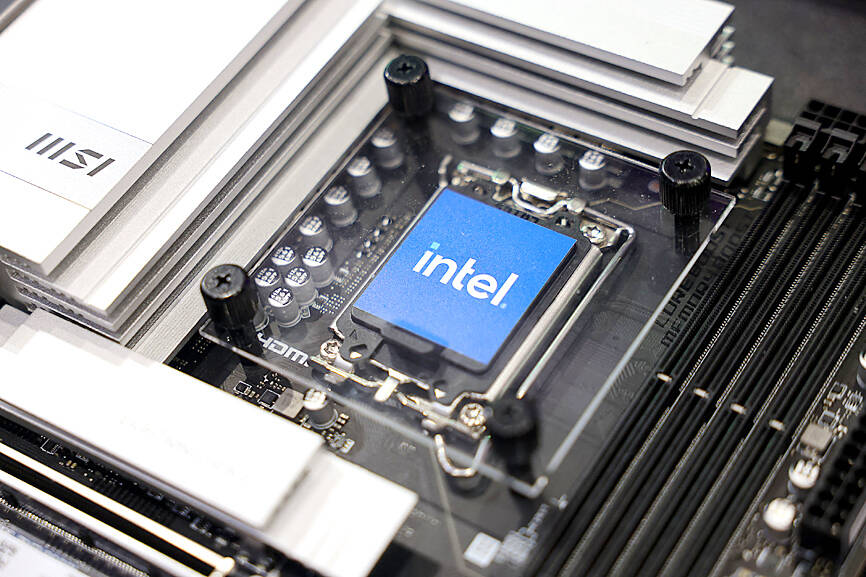Intel Corp’s decision on Monday to postpone its planned factory in Germany marks a setback for the European Union’s semiconductor ambitions and will reignite controversy in Berlin over where to allocate 10 billion euros (US$11 billion) in earmarked subsidies.
The embattled US chipmaker’s move to delay the project in Magdeburg by about two years is a blow to the EU’s goal of producing one-fifth of the world’s semiconductors by 2030. The German facility was on track to be the biggest plant supported under the EU’s Chips Act that was passed last year.
Governments around the world have lavished public funds on the chip industry in a push to localize production of components that control everything from cutting-edge artificial intelligence to everyday gadgets. The push comes after COVID-era supply disruptions and as rising tensions between the US and China over Taiwan could interfere with a key source of the essential technology.

Photo: I-hwa Cheng, AFP
“We have earmarked funds that will continue to be needed for our semiconductor projects,” German Chancellor Olaf Scholz told reporters yesterday during a trip to Kazakhstan. “It is obvious that we also want to promote semiconductor development in Germany.”
No state money has been used yet for the Magdeburg project, which was in the final stages of getting EU approval. Its delay could free up funds as Germany faces a financing gap of at least 12 billion euros in next year’s draft budget.
German Minister of Finance Christian Lindner said all funds not required for Intel must now be reserved for the reduction of “open financial questions” in the federal budget. “Anything else would not be responsible politics,” he said in a post on X.
Lindner is a key protagonist within the German government who insists the country sticks to its constitutionally enshrined borrowing limits. Officials like German Minister for Economic Affairs and Climate Action Robert Habeck, however, have lobbied to reform or suspend the so-called debt brake to help finance investments in technology and crumbling infrastructure.
The funds for the government’s semiconductor subsidies are not part of the regular budget, they are located in a special pot called climate and transformation fund managed by Habeck’s ministry.
Intel’s delay is “purely a business decision,” Habeck said, speaking on the sidelines of a start-up forum in Berlin. Germany will maintain its strategy of encouraging semiconductor production in Europe, he said.
Intel’s decision adds to a string of recent bad news for Germany. Volkswagen AG, its top automaker, made a shock announcement this month that it wants to end a decades-old labor pact and possibly close domestic factories, citing lagging demand. BMW AG cut its full-year earnings guidance and is wrestling with a large recall over potentially faulty brake systems supplied by Continental AG.
Investor confidence in Germany’s economy plunged to its lowest level in almost a year. An expectations gauge compiled by the ZEW institute fell to 3.6 this month from 19.2 last month. None of the 22 economists surveyed by Bloomberg before the release foresaw such a slump.
“The hope for a swift improvement in the economic situation is visibly fading,” ZEW president Achim Wambach said yesterday in a statement. “Although the falling economic expectations for the euro zone point to an overall rise in pessimism, the drop in expectations for Germany is significantly greater.”
To be sure, other German chip projects are making progress. Taiwan Semiconductor Manufacturing Co (台積電) broke ground in eastern Germany last month for its first European plant. About half of the money for that 10 billion euros fab will come from state subsidies.
“Without Intel in Magdeburg, Europe is lacking its flagship project,” German industry group Silicon Saxony managing director Frank Bosenberg said. “Neither a European market share of 20 percent or the desired technological sovereignty through semiconductor production below 10 nanometers seem realistically achievable by 2030.”
Comments will be moderated. Keep comments relevant to the article. Remarks containing abusive and obscene language, personal attacks of any kind or promotion will be removed and the user banned. Final decision will be at the discretion of the Taipei Times.
Intel’s German plant delay lands blow to EU’s chip ambitions




